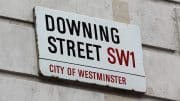Chancellor Jeremy Hunt yesterday unveiled what he called a huge boost for British competitiveness in a so-called Autumn statement for growth.
He announced a series of measures with an “overall impact of £20bn a year within the decade – the biggest ever business boost for business investment in modern times”.
Key to this was a series of measures such as the abolition of class two national insurance entirely, saving the average self-employed person £192 a year, as well as a one per cent cut in Class 4 national insurance from April – and a two per cent cut in employee national insurance contributions by the start of next year.
He said the government will invest £500m over the next two years to fund more innovation centres to help make the UK an “AI powerhouse”, something inspired by the success of the supercomputing centres in Edinburgh and Bristol.

Adam Zoucha: conditions remain tough
He announced £50m in funding over the next two years to increase the number of apprentices in engineering and “other key growth sectors” and an increase in the National Living Wage by 9.8% to £11.44p per hour.
In response, Adam Zoucha, MD EMEA at accounting workflow provider, FloQast described it as the offer of “a cashflow band aid” with the capital allowance enhancements.
He said: “The ability to fully expense capital investments against profits, will keep more cash in business bank accounts. It will also help business leaders secure sign off for new investments that enhance productivity. It’s a good leaver for organisations looking to drive growth in a challenging market and will enhance GDP.
“This measure alone is not enough to re-invigorate business. The economic conditions remain tough, and organisations need to retain a tight grip on every expense.”
Faye Church, Senior Chartered Financial Planner, Investec Wealth & Investment was quick to attack the dividend allowance reduction from £1,000 to £500 in April 2024. “It’s an allowance that’s almost not worth having,” she said. “An investment of £15,000 in the FTSE 100, yielding on average 3.5%, would breach this threshold.
“It may be worth continuing to reassessing whether dividends are the most effective way of receiving income, especially if you own your own business or have the flexibility to generate an income in other ways. Fixed income investments such as corporate bonds and gilts have definitely been a very attractive option whilst interest rates have been so high.”
The splashing of taxpayer cash for frivolous purposes, like on the Hay Festival, is hardly fiscally responsible
Neil Rudge, MD of Enterprise at Shawbrook said: “As rate rises appear to have reached their peak and inflation continues its retreat, the Chancellor has been given some breathing space to give businesses more comfort to unleash capital and commit to more substantial investment projects going forwards; good news both for the business and wider UK economy.”
Mike Randall, CEO of Simply Asset Finance said the Living Wage increase is bound to be well received by workers, but “we should not forget that for small businesses it’ll be yet another increase to overheads and present a tough balance for achieving growth alongside an increased payroll.
“Support to address this increase needs to be top of the agenda for the Government when thinking about the recovery of the UK economy. It’s imperative SMEs receive the right advice, support and initiatives to enable long-term planning, and access to the right financing solutions for them to prosper.”

Mike Randall: tough balance
Mark Littlewood, Director General at the Institute of Economic Affairs, called it a step in the right direction towards lower taxes and economic growth, “but not a leap”.
He said: “Amidst the rhetoric about tax reductions, this government is presiding over one of the heaviest tax burdens in the past seven decades. The frozen income tax thresholds amount to a stealth tax increase of around £40 billion annually by some estimates. The Chancellor is essentially taking with one hand and giving back with another.
“There was also shockingly little about reducing government spending. The splashing of taxpayer cash for frivolous purposes, like on the Hay Festival, is hardly fiscally responsible. The rapid increase in the minimum wage risks businesses cutting jobs and hours of some of the most vulnerable workers, including those with less skills and the young.
“There is far more work to be done to reduce the tax burden, decrease spending, cut red tape, and reform public services.”
Regarding Mr Hunt’s comments on the need to help business by tackling late payments, Alex von Schirmeister, UK Managing Director, Xero, said: “The mental and financial strain that late payments cause business owners has to end immediately. We’ve been pushing for action on this for years but for every day that goes by, more businesses are going under.
The Chancellor’s introduction of rules for firms bidding for government contracts do very little in the way of helping to recoup the thousands of payments still outstanding
“We needed to see more teeth shown on this issue, and more urgency. We wanted it to be a final warning to big businesses who sit on suppliers’ cash. Let them know it’s not a late payment, it’s unapproved debt.
Alan Thomas, UK CEO at the insurer Simply Business described a “rush of reforms for small businesses and self-employed people” that will be well received by many but concerns remain around whether they can “fortify this over-stretched sector”.
He said: “Our research revealed that an eye-watering £32bn in late payments is owed to small businesses, and the Chancellor’s introduction of rules for firms bidding for government contracts do very little in the way of helping to recoup the thousands of payments still outstanding. The government itself has said that paying small businesses on time could boost the economy by £2.5 billion annually – yet decisive action has not been taken.”
He described the business rates support package, particularly the extension of the business rate relief and freeze in the small business multiplier as a welcome update, “but a rise in the standard rate multiplier has been described as ‘disappointing’ by industry leaders, who have pointed to the fact that hospitality businesses broadly operate out of larger premises.
“The Chancellor also failed to commit to increasing energy support for small businesses. Over a quarter of SMEs are spending up to 40% more on energy each month compared to last year.”
Related
Post election tax rises inevitable, say bosses





